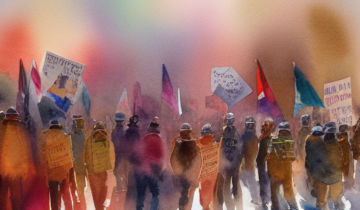The Real Enemy Isn’t this Administration—It’s the Corporate Machine Behind It
When frustration boils over, it’s easy to point the finger at the current administration, but a general strike isn’t about party politics. Political faces are on the news, their policies dominate the headlines, and their actions—or inactions—shape our daily lives. However, focusing solely on the party in power overlooks a bigger issue: the real problem isn’t just political leadership. It’s a general strike against corporate power, which is pulling the strings behind the scenes.
As The Survival Guide for a General Strike explains, the system isn’t broken; it’s functioning exactly as intended. Laws, regulations, and economic policies are designed not for the public good but to maximize profits for corporations and the wealthy elite. Lobbyists draft legislation, corporations fund campaigns, and the cycle repeats regardless of which party holds power. Voting every few years isn’t enough to dismantle a machine built to keep us working harder for less while the top one percent consolidates more wealth and influence.
We Get New Leaders. They Get The Same Results.
The corporate capture of our political system means that real decisions, those affecting wages, housing, healthcare, and education, are made not in the interest of citizens but in boardrooms. Politicians may change, but the playbook remains the same: deregulate industries, weaken labor protections, divide the public, and drain public funds into private pockets. When billionaires can buy influence as easily as they buy yachts, it’s clear who’s truly in control.
That’s why real change can’t end at the ballot box. It must go deeper. Because what we’re fighting against isn’t just a government—it’s an economic system based on reactions, distractions, and endless extraction of our country’s wealth. This isn’t a partisan battle. It’s a power struggle. And power only listens when its profits are at risk. Not participating in a rigged game isn’t giving up. It’s a wake-up call for everyone.
It’s Mutual Aid Over Monopoly.
This is why action must target the corporate structure itself. Striking against one administration is like trimming the leaves off a weed; the roots still remain. But when people collectively refuse to feed the corporate conspiracies by withholding labor, money, and compliance, the corporate foundation begins to weaken. A general strike isn’t just about walking off the job. It’s about ending dependence on corporations, redirecting support to local and ethical businesses, and creating mutual aid networks that bypass exploitative systems.
The strength of this approach comes from its decentralization. No single politician can prevent millions of people from choosing where to spend, how to work, and what to support. When workers refuse to generate profit and consumers refuse to fund exploitation, the corporate grip on politics weakens. History shows this: labor laws, minimum wage, and workplace safety standards were achieved through collective economic action, not by waiting for political saviors.
So instead of shouting at the TV or blaming one administration, we need to ask: who writes the rules they enforce? Who benefits from our anger, division, and labor? The answer is the same corporations whose logos line our shelves and whose dollars flood campaign coffers.
It Is Time for People Over Profits
Change won’t come from begging power—it will come from challenging it where it’s most vulnerable: its profits. A general strike against corporate power is not a left or right issue. It’s bottom versus top. It’s people versus profit. It is social versus capital. And when we remember that, we regain the leverage they fear most. You can start now with the “30-day disengagement challenge–the Un-Game” that turns our daily activities into a powerful protest and builds a better community for us all.
So, the next time the news tells you who to blame, ask yourself: Who profits from this struggle? Who keeps winning while we’re losing? It’s no longer about left or right. It’s about up versus down, profit versus people.
And when we remember that, WE WIN!! Not with rage, but with refusal. And the most disciplined refusal we have is a general strike grounded in nonviolence.”



